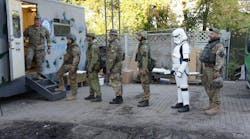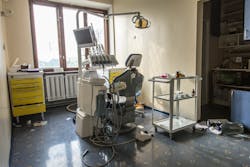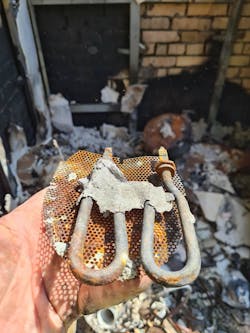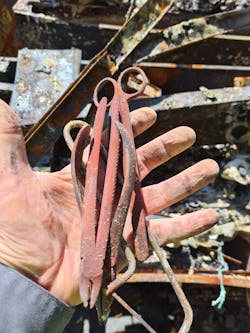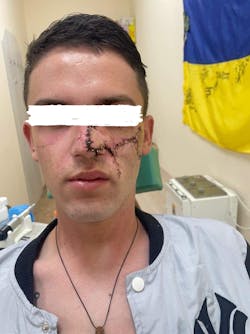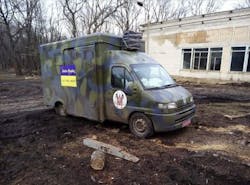From the front lines: Ukrainian dentists’ stories of heartbreak and survival
Author’s note: Calling all dental professionals! Ukrainian volunteers need your help. There is an urgent need for all supplies. What’s needed most are dental forceps, elevators, luxators, burrs, endodontic files, polishing strips and points, articulation paper, as well as tourniquets and chest vented seals. Also vitally needed is a mobile dental clinic or van that’s capable of being transformed into a dental clinic. Contact Nova Ukraine, a non-profit organization in San Francisco, which is ready to cover all US–Ukraine shipping expenses.
In the face of military invasion and economic breakdown, Ukrainian dentistry as a medical profession and business venture faces historical, professional, and interpersonal challenges in the name of Ukraine’s freedom and future. Since the full-scale Russian invasion on February 24, 2022, Ukrainians have lived under martial law for the fourth time in the country’s history. Martial law involves the temporary substitution of military authority for civilian rule. This means there is no more comfortable life, especially near the occupied territories and frontlines.
According to jurisprudence, all medical facilities switched to the martial operation, prioritizing wounded military patients. Therefore, all planned civil hospitalizations and surgeries have been canceled. Medical facilities are stocking up on supplies and being equipped with autonomous sources of electricity. All regional emergency medical facilities are ready to render uninterruptible comprehensive care. Dentistry has also reorganized. Standards of care, fees, and available treatments vary depending on location. Immediately after February 24, dental offices closed. When the initial shock subsided, Ukrainians quickly determined what they had to do. This is when the differences between regions became apparent.
Central and Northern Ukraine
Ukraine’s capital, Kyiv, was very close to invasion in March. All businesses stopped activities, and dental offices and labs closed following the widespread and overwhelming devastation. Mayor Vitali Klitschko provided weapons to anyone ready to defend the city. Many dental professionals joined the Army or local territorial defense, in most cases with their dental instruments.
After the first months of military service, dentists, oral surgeons, and lab techs were needed in their professional roles to treat acute dental pain between the war attacks. In May, the situation stabilized, and many dental offices reopened to offer pain treatment. During the first months of shelling, Kyivans used some dental offices with sturdy basements and walls for shelters. Afterward, a wave of emigration swept the nation. Women escaped to the western provinces or abroad trying to save their children. Overall, central Ukraine hasn’t been attacked as heavily as other regions; therefore, dental care to civilians has remained relatively undisturbed.
The catastrophic economic situation has emptied Ukrainians pockets, but the dentists who share their stories here confirm that they keep their fees nominal and dental care accessible. Military patients receive help for free. The chief concerns of central and northern Ukraine are repeated intrusion and the elevated radioactive pollution, which is due to the Russian soldiers churning and spreading the heavily radioactive Chernobyl soil.
Eastern Ukraine and occupied territories
This is where war started in 2014, when eastern regions Donetsk and Luhansk were occupied by the Russian Army. A majority of noncollaborative medical professionals, as well as dental care providers, left their jobs and homes and moved to the central or western provinces. After the 2022 invasion, emigration from the occupied territories has been forbidden by the pro-Russian authorities. The only way out of military occupation remains through Russia and the filtration camps to neighboring countries, with the Baltic states and Georgia the most desired destinations.
Dentists stuck in the occupied territories are forced to collaborate and provide care to the Russian Army. According to the dental professionals here, public access to care is nearly catastrophic. Clinics are decimated and marauded. Personnel have fled or become demoralized. This leaves the occupied territories and nearby villages without any help. The only way to get dental care near a frontline is through a dental volunteer organization. Mobile dental clinics may be located near military positions, but this is extremely dangerous. Mobile clinics, along with other unfortunate civil facilities, are artillery targets for the Russian Army, and they’re under constant fear of being blown up.
Western Ukraine
All regions that share borders with friendly foreign countries became an inner refugee or transit hubs. The tsunami of temporarily displaced Ukrainians surged westbound. Lviv, Ivano-Frankivsk, and Ternopil accommodated, fed, clothed, and provided medical care to those in need. These regions remain highly populous, and they’re providing employment opportunities for inner migrants, including dental professionals. Ukraine is a unitary country, so no additional licensure is required for relocation within a state.
Ukrainian dentists have undergone a tremendous transformation in their professional relationships. Self-reliance and mutual help have become a fundamental necessity. Sharing and referring patients to each other, to whoever is still available, functional, or possesses specific instruments, is the new normal in Ukraine. Unfortunately, such moral and ethical callings may conclude in calamity. In the occupied territories, whoever stands up against the new government’s illegal actions faces persecution.
The Ukrainian dental community sees the Russian aggression as a terroristic operation and calls all colleagues around the world to boycott Russia as a terrorist state. They created a registry, dentalboycott.com, that lists the companies that have stopped or continued business with the Russian Federation and emphasizes that every dollar spent in Russia fuels war. European colleagues, led by orthodontist Dr. Mike Mew, help Ukrainian refugee dentists find housing and jobs through the Facebook group, Helping Ukrainian Dentists.
Stories from Ukrainian dental professionals
Ihor Vovk, dental lab owner and technician, of Bucha, works in Irpin
Perfectionism is my professional trait. In my early career I dreamt of having my own dental lab where I could master the art of dental prosthetics. I quit my job in 2003 and opened my own lab in Irpin, the capital's prosperous suburb. Three colleagues and I created dental masterpieces. The happiness ended in February 2022. What the pandemic didn’t finish off, the Russian army obliterated. My lab was completely destroyed. All my expensive devices, modern equipment and tools were burned. I lost everything: my job, my business, and my dream. But what hurts me the most is my dental lab tech museum, which is now gone. I collected lab tech antiques: spatulas of different shapes, foot job mechanical soldering iron drill, all sorts of occluders, the very first electrical polishing motor in dental history, and a myriad of small tools and unique items that were invaluable.
But I grieve nothing compared to what we’ve seen here in Irpin. My neighbors mourn their children. Irpin and Bucha became common names for massacres, where civilians were tortured and children’s bodies were mined. I don’t know how to wrap my head around it, how Russians and Belorussians can live with themselves. My wife with daughter moved abroad, but my parents refused to flee. They died and someone buried them. When I returned home, I found their graves.
My son and I volunteer to help people survive. We keep ourselves busy so we don’t have time to despair. My Seventh-day Adventist Church supports me and many others. My colleagues bought me some instruments so I can start working, but we still need many tools: a sandblaster, steam generator, and furnace for ceramic. There is no help from the government for destroyed businesses. I rely on my strength and a hope that someone will donate lab tech equipment so I can rebuild my dream.
Contact Vovk at [email protected].
Dr. Pavlo Klochko, prosthodontist from Kharkiv
Since February 24, I live in one of the most dangerous cities in Europe. My future has been crossed out for many years ahead. My family accepted the new reality head on and calmly decided to separate. My wife and daughter fled the war and went abroad. I stayed without any illusion of a happy ending. It’s terribly, horribly, abysmally depressing. I am grateful to all countries that welcomed Ukrainian women and children and provided them with food, shelter, and protection. My family is safe, and I can focus on my small part of helping carry Ukraine to victory.
During the first days of the war, I did not work. These were days of total panic, despair, and fear. The street fights raged on, and the city was close to being sieged. Survival became our priority, and day after day we learned how to do double duty. I started driving a mail truck, and after that I joined volunteer groups to deliver food, medicaments, and to transport people. I didn't accept life-threatening positions like driving people from the occupied territories.
After a month, a soldier called and asked me to treat his dental pain. That's how I returned to my profession, at first working on my own. I later found an assistant and administrator. We posted online to let people knew we were back to business. Dr. Igor Noenko, a prominent Ukrainian endodontist and blogger, offered his instruments for free. Imagine, I was one of a handful working dentists in a city of 1.4 million people. Without my colleagues, there was no one to share the increased patient load. First, my colleagues who left the city referred their patients to me, and second, people arrived from the occupied towns and villages. To keep fees at the pre-war level, we operate at a loss. We are one-third staffed, and we work like titans.
Kharkiv is located 38 km (23 miles) from the border of the aggressor. There’s no doubt artillery attacks will keep reaching us until the end of the war. We operate under constant air attack sirens, but nobody pays attention to those scary sounds, and they’re widely perceived as routine now. It’s normal to step on fragments of a missile or to recognize an anti-tank landmine. We face death every day.
I have volunteered for Tryzub Dental since 2019. I continue this mission by providing free dental services for the military, police, first responders, and territorial defense. We work on one goal: to see our new Ukraine after this war. We fight for Ukraine’s rebirth, freedom, and democratic values.
Dr. Andrii Sapeliuk from Ivano-Frankivsk
Our city is in west Ukraine, far from the hot war zone. We hear the air raid sirens, but we haven't been attacked yet. We feel rather safe, so Ivano-Frankivians try to get on with our lives despite the terrible situation of our nation. Since there is no serious disruption in our everyday lives, we’ve welcomed our temporarily displaced citizens from the east and south, including our fellow dental professionals. This is fortunate because without any additional documentation, a dentist can work in any part of Ukraine.
Many clinics have employed dentists, dental assistants, and lab techs in areas where the inner immigration of both providers and patients is high. The clinic next to mine is new; it’s been opened by a refugee dentist from severely bombed Kharkiv. Our clinic was closed for only five days following the “mental anguish phase” of a colossal wave of migration and news in February. After a week we realized that panic didn’t help, so we returned to work. We initially treated only patients with urgent pain, increasing working hours and treatments as we went.
Short staffed, we’re still far from our prewar speed and capacity. My supplier is working hard to keep us well stocked, but only while pre-war supplies are not yet exhausted. The biggest problem we face is the Ukrainian hryvnia’s (our national currency) devaluation in the context of industry’s import dependence. We are prepared to endure the void in the market. Hopefully our manufacturers will reopen soon, and the suppliers will diversify their imports, moving away from Russia and China and closer to Europe and the US, despite the price. Nonetheless, dental care in noncombat regions remains satisfactory. Clinics are open, staff is present, and supplies exist. Patients are mostly interested in restorative, endodontic, and periodontic care.
Also by Anna Filonenko
Oral care during war: From the front lines of Ukraine
Dr. Margarita Seredenko, displaced from Chertnivtsti and currently in Vilnius, Lithuania
Before the war I worked as a general dentist, covering a little bit of everything. Our clinic was open every day, year round, from early morning until late at night. In “good season,” I was booked six days ahead, and in “slow season,” one to two days ahead. Ukrainian dental patients always had the opportunity to be seen on the same day.
The Ukrainian legislature protects dentists' right to work no more than six hours a day (one shift), due to the nonphysiological positions, vision strain, and risk of developing hand-arm vibration syndrome. I worked one shift every day, six days a week. On occasional Sundays I picked up more hours and treated patients on two shifts. Everything was great until the war started. Our clinic was open until March, when intense air strikes began. Half of our personnel fled the war. They are returning home but are not yet available to work due to closed childcare facilities and schools. Dental assistants are in huge demand right now.
Patients are also coming back. I’m thinking about returning home in a month or so. I feel safe in Lithuania, but I cannot meet my professional potential here. My dental training is not valid here. I’d never planned on working abroad, but now I regret that I didn't receive an international version of my diploma.
Like many Ukrainian dentist-refugees, I took a job as a dental assistant. But without knowing Lithuanian or English, it's impossible to sustain successful employment. My job lasted one month. Ironically, I’m happy here because of the language. I don't hear any Ukrainian, but no Russian either. It’s heartwarming to be among pro Ukraine and pro freedom people. Hopefully, Ukraine will win the war soon so I will be able to return home. I’ll always remember my Baltic “trip” and Lithuanian support.
Dr. Olena Kulibaba, Lieutenant-Colonel of Armed Forces of Ukraine, military maxillofacial surgeon, Odesa
Ukrainians face a dreadful situation. We have a massive number of wounded but low numbers of medical personnel available. Thirty percent of injuries are in the head-neck region, and an overwhelming 70% are in the stomach and limbs. The wounds we encounter are war specific: firearm, shrapnel, and mine blast, with zones of a primary infection, secondary necrosis, and burns with inflammation. The paramount rule of tactical medicine stresses the importance of the first “golden” hour. Unfortunately, it’s not always possible to render medical help on the battlefield quickly, but we learn on the go.
Maxillofacial injuries leave not only physical, but mental scars too. The path to full rehabilitation is long and hard. Sometimes we operate on a patient many times so they can eat, talk, and smile functionally and naturally. Odessa Military Hospital has always been one of the best, providing and not asking for help. But now we’re constantly in need of supplies, from gloves to ultra-special equipment that wasn’t necessary during peaceful times. We’re blessed to be well supplied by the government, but now we need more of everything, and we need it faster. The donations from the Ukrainian volunteer movement help us fill in some gaps.
The war is a horror, yet it creates space for miracles. Sometimes absolute strangers lend a helping hand. We’re grateful to all foreign colleagues who feel our pain and donate critically indispensable osteosynthesis implants. I wish generous people could donate some joy to us too. We are exhausted. We work 24/7, far from home. We want to go home, but we take this war personally. It's our fight for our patients, for their chance to survive and return to a maximally normal life.
Contact Dr. Kulibaba care of [email protected].
Ihor Yaschenko, dental volunteer, cofounder of Trident Dental (Tryzub Dental) in the Dnipropetrovsk region near the eastern frontline
For me, the need for mobile dentistry began in 2014, when the Russian Federation invaded our country. I saw the problem with the system: Ukrainian military medicine does not encompass a comprehensive dental exam and treatment for its recruits. When the motherland is in grave danger, no one really looks in the mouths of those defending our country. When random civilians took up arms, they realized on the battlefield how sick their mouths were. Dental pain plays a huge role in combat capacity. Treating soldiers’ oral disease elevates our chances of victory.
As a current dental professional and former military member, I see the need for change. By establishing a mobile dental clinic, I’ve made my contribution to Ukraine’s medicine and modern military dentistry. I bought a small bus and equipped it with a dental chair. I found volunteers and dentists and offered help to the nearest military base. It was an ambitious initiative, and no one has done mobile military dentistry before. But we’ve grown fast, from an urgent care mobile clinic to a multi-location all-specialty all-terrain mobile dental patriotic society called Tryzub Dental.
We are more than a clinic; we’re a brotherhood. We are pioneers connecting civilian health-care providers and military medicine for the best of Ukraine. Doctors work shifts and rotate specialties so that every soldier patient receives treatment. Since we’re near the frontline where local dental care is disrupted, we started accepting civilians and their children. It's heartbreaking to see the dismantled medical care in the occupied territories. Most dental care providers fled the war zone. The few who stayed are now at the occupants’ mercy.
The Russian army is in the identical sad dental condition, and sometimes they force Ukrainian dentists to treat them. I don’t judge my fellow Ukrainians. It's our goal to survive. If to survive one needs to bow to the enemy, it’s OK. But I applaud my colleagues who take dire action and inflict self-injuries like breaking their arm so they don’t have to obey the occupants.
We’ll survive and revive because we are not alone. It's awesome to see how doctors, suppliers, and equipment donors are grateful for the chance to help. Yes, people feel thankful to become volunteers and invest in Ukrainian victory! We receive donations from all over the globe. But our goal is to become a full-cycle all-Ukrainian production, with the ultimate goal to elevate Ukraine, its medicine, and military dentistry to the highest standards.
Contact Yaschenko at [email protected].
Dr. Oksana Lytvynenko from Severodonetsk
Severodonetsk is a small town in the Donbas region and is currently occupied by the Russian Army. My life has changed dramatically since the beginning of the war. Before the invasion I worked at two dental offices. Severodonetsk was a fast-growing town, and we were happy with our growth, purchasing new equipment for better diagnosing and treatment.
With the first shelling, many people left town, including dental personnel. Doctors and assistants ran for their lives, leaving behind their homes, businesses, and careers. Some fled to safer regions, and some moved abroad. Now Severodonetsk is in ruins. Nothing is working, there’s no electricity, no water, and no medical care. It’s a humanitarian catastrophe. It’s a ghost town with occasional souls on the streets looking for some water or provision, like an apocalyptic film.
The military people have medical help and a chance of evacuation and hospitalization. But civilians, especially in small towns and villages, are on their own. All dental offices are in rubbish, destroyed and looted. There is absolutely no dental care in active combat and occupied territories, only some fearless dental volunteers in a mobile dental clinic occasionally.
Before the war, we were testing teledentistry, mostly for dental pain. Now all contacts are disconnected. In this time of terror, everyone is busy saving themselves. From February 25 until March 11, me, my husband, my mother, two cats, and a bunch of our neighbors hid in the basement of our apartment building. It was terrifying. I was so stressed that I developed a stutter. My legs and joints became inflamed because it was so cold.
When we first fled Severodonetsk, it was pure luck. Every day, people gathered at a certain bus stop waiting for a good Samaritan to take them out of this hell. One day, two buses saved 60 people. Now I am in Kyiv trying to find a job. It’s possible to become employed, with a better chance in a dental specialty, for example, orthodontics. Unfortunately, I’m a general dentist and not in demand.
